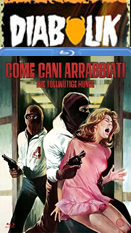
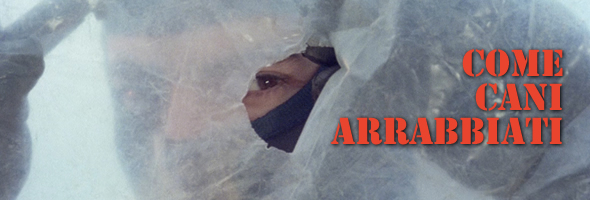


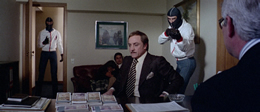
With its funky, pop-laden soundtrack and aggressive scenes of violence and police pursuit, it's tempting to classify this film (who title translates as "Like Rabid Dogs," 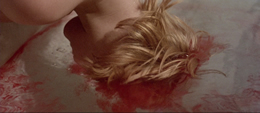 similar to a certain Mario Bava crime film) as part of the poliziotteschi wave of violent '70s cop thrillers, and to a certain degree that fits. However, what we also have here is a particularly savage juvenile delinquent film in line with such social outrage films as Naked Violence and Because of the Cats with marauding youths tearing apart the fabric of society just because they can. This one was barely seen outside of Italy, with only a scarce Greek VHS commemorating it on home video until its surprising and very welcome revival on Blu-ray and DVD from the heroic genre label Camera Obscura.
similar to a certain Mario Bava crime film) as part of the poliziotteschi wave of violent '70s cop thrillers, and to a certain degree that fits. However, what we also have here is a particularly savage juvenile delinquent film in line with such social outrage films as Naked Violence and Because of the Cats with marauding youths tearing apart the fabric of society just because they can. This one was barely seen outside of Italy, with only a scarce Greek VHS commemorating it on home video until its surprising and very welcome revival on Blu-ray and DVD from the heroic genre label Camera Obscura.
The action starts when two masked men hold up a sports stadium during a big soccer match and shoot one of the guards in the head, which sends intrepid Inspector Paolo Muzi (Sabagh) prowling through the criminal underworld including, uh, zookeepers. As it turns out, the crime is part of a spree of violent muggings, rapes, and heists masterminded by Tony (Deported Women of the SS Special Section's Barro), a rich, spoiled psycho who's recruited his cynical college friends, Rico (Evil Eye's La Torre) and Sylvia (Grapputo), into a sort of amoral criminal club freed from society's rules. Things escalate 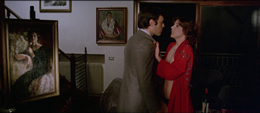 when the trio takes a female hostage after one stickup and winds up terrorizing and murdering her in a bathtub, after which they decide to set their sights on the local hooker population. That gives Paolo the idea to plant an undercover female operative (Salon Kitty's
when the trio takes a female hostage after one stickup and winds up terrorizing and murdering her in a bathtub, after which they decide to set their sights on the local hooker population. That gives Paolo the idea to plant an undercover female operative (Salon Kitty's 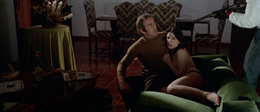 Senatore) on the scene (who also happens to be his bedmate), but that in turn leads to another unexpected chain of bloody consequences as the frustrated investigator finds his progress halted at every turn.
Senatore) on the scene (who also happens to be his bedmate), but that in turn leads to another unexpected chain of bloody consequences as the frustrated investigator finds his progress halted at every turn.
Come Cani Arrabbiati is an unusual change of pace for director Mario Imperioli, who passed away at the young age of 46 a year after this was released. He was best known for his two hit sex comedies with Gloria Guida, Blue Jeans and Monika, and he pulls out all the exploitation stops here with bloody bullet gags and rampant female nudity. However, he also subverts viewer expectations by stressing the cop hero's inability to crack the social barriers that keep the evildoers protected from prosecution, culminating in a truly outrageous and unexpected finale involving a group of socialist protestors that feels like Bernardo Bertolucci on acid. The film features loads of other surprises, too, most notably including a bizarre quasi-comic blackface riff on Othello and an incident involving an affluent gay couple on a boat that adds another strange layer to the film's already unorthodox view of society.
In keeping with their stellar track record, Camera Obscura brings this fascinating gem out of obscurity with an excellent transfer retaining the gaudy '70s color scheme and rich, gritty texture of the original film. It looks great in motion and appears to be an immaculate transfer from a negative that's probably been sitting unattended for decades. The Italian mono track is  presented in DTS-HD with optional English and German subtitles, and usual, there's also an audio commentary (in German with optional English subs) by Christian Kessler and Marcus Stiglegger, whose amiable rapport should be very familiar to the label's fans by now. As usual they do
presented in DTS-HD with optional English and German subtitles, and usual, there's also an audio commentary (in German with optional English subs) by Christian Kessler and Marcus Stiglegger, whose amiable rapport should be very familiar to the label's fans by now. As usual they do  a solid job dissecting the Italian genres being pulled apart here and rattle through the credits for almost everyone on the screen, with a particular focus on Imperioli's brief but colorful career.
a solid job dissecting the Italian genres being pulled apart here and rattle through the credits for almost everyone on the screen, with a particular focus on Imperioli's brief but colorful career.
The first featurette here, "When a Murderer Dies," clocks in at just under 50 minutes with film historian Fabio Melelli framing the last video interview with cinematographer Romano Albani, who went on to Dario Argento's Inferno. Both of them discuss Imperioli at length and also cover the influence of cinematographer Luciano Tovoli, who played a vital role in the careers of both men. "It's Not a Time for Tears" (don't worry, these titles make more sense when you've seen the film) devotes 31 minutes to assistant director Claudio Bernabei, who goes through this film and the rest of his career including other familiar characters like his mentor, Joe D'Amato. Finally the set closes out with the very lively theatrical trailer and liner notes by Kai Naumann, who traces the film's themes back to Baudelaire of all people and studies it as a descendant of A Clockwork Orange. Great stuff.
![]()